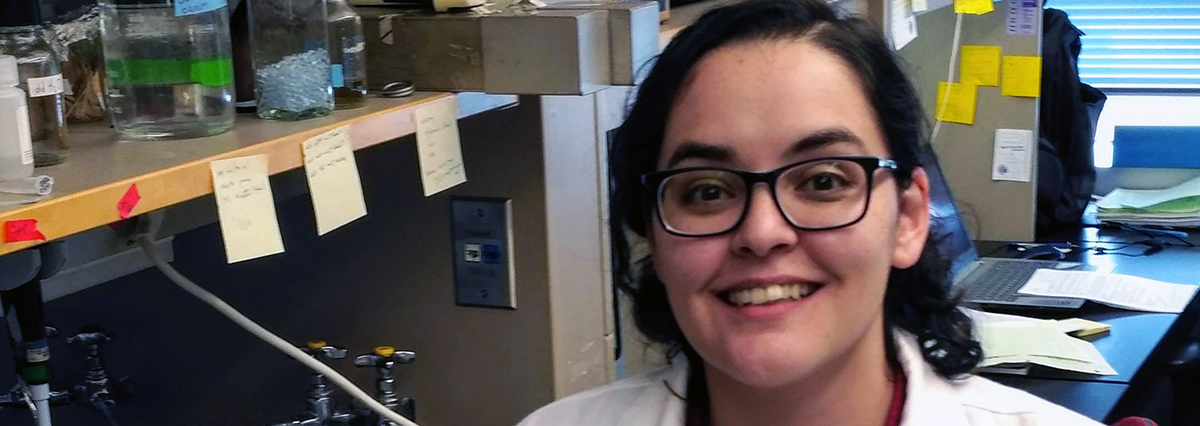Pew Latin American Fellowship Awarded to CU Postdoc
Candia uses light to explore protein activity
By Mark Couch
(November 2019) Carmen Hernández Candia was working on her PhD in Mexico when she attended a talk at a biophysics conference about using light to control the function of different proteins.
The speaker, Chandra Tucker, PhD, associate professor of pharmacology at the University of Colorado School of Medicine, made such an impression that Candia knew she wanted to come work with her.
“I was really surprised by the things she was doing and I really love her work, so I decided that’s where I want to go,” Candia said. “You know, it was instantaneous. I want to work with her. I want to go to that lab.”
So, as Candia was finishing her degree, she called Tucker, based on attending that talk. “I just contacted her and I said, ‘Hey, I’m Carmen and I would like to work with you.’”
A few Skype calls and interviews later, Candia arrived in Colorado to work in Tucker’s lab as a postdoctoral researcher. That was February 2018.
A little over year later, Candia became one of only 10 young scientists, and the first from the University of Colorado School of Medicine, to receive a Pew Latin American Fellowship in the Biomedical Sciences. The program gives recipients an opportunity to increase their scientific knowledge by promoting exchange and collaboration between investigators in the United States and Latin America.
The award provides an annual salary stipend for two years. In addition, award recipients who return to Latin America receive a grant for equipment to support establishing an independent laboratory.
Candia grew up in Mexico City. “When I was a kid, my mom is always telling me, I used to ask the weirdest questions, like ‘Why is the moon not falling up?’” Candia said. “I was always really curious and I always loved to watch National Geographic programs and things like that. But it wasn’t always that clear to me that I was going to end up doing this kind of work.”
While Candia earned bachelor and master’s degrees in physics, her parents also went back to school to earn degrees. Her mother became a lawyer and her father completed an engineering degree and they traded talk about test scores.
“We could play around,” Candia said. “I could say, ‘Hey, I have an A, and they would say, ‘I have an A+.’”
Candia pursued a PhD in molecular biology at the Instituto Potosino de Investigación Científica y Tecnológica in San Luis Potosí, Mexico, and, fusing her interest in physics and biology, she learned how to develop and work with “optical tweezers,” which use light to manipulate microscopic objects as small as a single molecule
As a postdoctoral researcher in Tucker’s laboratory, Candia is exploring how the formation of different types of cellular condensates influences protein activity. Inside cells, some proteins coalesce into clusters that perform a specific function—carrying out a particular metabolic reaction, for example. While assembling into fluid, liquid-like condensates can enhance enzymes’ catalytic capabilities, the formation of clusters that are more rigid and fibrous may hamper the activity of the proteins within them and impair the health of the cell.
Tucker has pioneered the use of molecular tools that can trigger the formation of protein condensates, and, since joining the lab, Candia has developed a companion method for disrupting these protein clusters.
“In the lab we have these tools, this protein and when we apply light, it’s forming droplets,” Candia said. “And then if you can keep adding light, then these droplets start to form these other structures that are more rigid, so we think that we can use this tool to try to understand the functions of these droplets.”
Candia aims to determine whether inducing condensation can enhance enzymatic activity and then whether it’s possible to steer the metabolic reactions. Also, by exploring methods for manipulating protein condensates it might be possible to create new strategies for breaking up toxic protein aggregations associated with neurodegenerative disorders.
As Candia continues her research, she hopes the Pew grant will strengthen her ability to land a faculty position in Latin America.
“It’s not the same as going and knocking on doors and saying, ‘Hey can you hire me?’” Candia said. “Now I can say, ‘Can you hire me? And I have this money to start my lab.’ Definitely, I hope that’s going to change the story a lot.”
